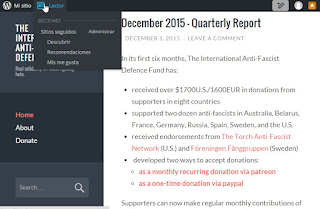Translation of the original Source in spanish "Las Colectividades Anarquistas" at-
http://reflexionesdesdeanarres.blogspot.com.es/2015/12/las-colectividades-anarquistas.html
During the Spanish Civil War on the Republican side, especially in Catalonia, Levant and Aragon, an important self-management practice took place; It can be considered one of the most important social experiments of the twentieth century.
The collectivities did not originate in the State, nor political parties, nor any vanguard, but were the result of popular will. As Abad de Santillan [historician] said, the bodies of the CNT or the FAI did not mark any guideline, the revival of industry, services, fields, were the work of a complete spontaneity where new foundations were established. In every workplace, administrative and management were formed committees set by the most capable and trustworthy workers. A few weeks after the conflict began, there was already a strong collectivist economy with labor regulation and truly worker and peasant production. The means of production were in the hands of workers.
Arguably, although spontaneity was an important factor, the success of collectives long rested on traditional community of Spanish people. Although sometimes seconded by the UGT, other groups and republicans personalities, were the CNT and the libertarian movement that ensured the creation of this new forms of economic and social organization. Gaston Leval, author of the most important works on the subject, Libertarian Communities in Spain [en, es], said that the achievements of the anarchist movement would not have happened if they had not been o the same page with the deep psychology of at least largely of workers and peasants. Another author, Daniel Guerin in The Anarchism [en, es], said that collectivization was not any imposition or bloodshed; peasants and small landowners who refused to join the work were respected, but then a lot of them integrated into collectivization when verify the benefits of it. Even the rights of people who were not integrated and could use some of the services communities are respected.
Recalling the proposals of classical anarchism, we must say that the structure of the collectivities was not homogeneous; some were close to communism (usually represent by The Naval in Huesca), but most responded more to collectivism. If some, the currency was abolished and equivalent bonds were created for the exchange (more in towns of Aragon), in others they continued to use that (Levante, Catalonia and Castile). In any case, regardless of the differences, which were prevalent in libertarian collectives values: solidarity, mutual support and equality. Brotherhood practiced for the benefit of the community and every person should contribute to the work to the extent of his capacities.
The richest collectivities helped the poorest through a Compensation Found, regional or local, which was responsible for accounting the income of each collectivized work. These Saving Boxes, were administered by people appointed by the general assembly of delegates from the collectives. Several works, such as those named, show the significant numbers of these Boxes, whose funds were obtained from the proceeds of the sale of the surplus of the most prosperous collectivities. All the resources, tools, machinery and technicians were avaliable for several communities in each region; there was no isolation, but an important support network that also effectively link city and countryside. Collective and self-managed work, not surprisingly, was not complete; Much of the economy was outside the collectivisation work, although we must say that in these cases there was at least some workers' control (i.e. on foreign banks and corporations).
If we talk about agricultural collectivization, it was centered in Aragon and Levante, lesser extent, in Catalonia. In Caspe, 14th and 15th February was established the Aragon Federation of Collectivities. We can talk about 40% of rural population that was part of the collectivities. The most numerous and robust, in terms of strength of its system were those of the Valencian region. In Castile, about 300 collectives were formed. We can speak of a great success in self-managed agriculture if we stick to the numbers: the crops increased a 30 to 50%. The agrarian collectivist regime was more complete and intense that urban and industrial collectivities, probably bocausw of the unions intervention in that cases; in the agricultural case, there was greater independence and there was room for all who wanted to join.
In the case of industrial and services collectivization, was main focus in Catalonia, although there were also other areas of the country. The factories of more than 100 workers were socialized and also the one over 50 could be at request of three quarters of the workforce. In Catalonia, the collectivisation work included, in addition to agriculture, the most important sectors of industry and services; we must highlight the remarkable war industry, the production was ten times higher than in the rest of Republican Spain.
Unfortunately, collectivities awoke early on suspicion of a large segment of the Republican side, from the bourgeois to the socialist parties. They had the greatest hostility in the Communists who directed their efforts to discredit and trying to override them. Uribe, the minister of agriculture, since the government boycotted the collectivisation activity; Thus, the decree that legalized, in order to remove control unions, arose from this person. In March 1937, groups of police and of assault guards, well chosen, from Murcia and Alicante began a march to the north to seize Cullera and Alfara towns and from that vantage point, launch a crackdown on collectives. According to Gaston Leval, it appears that the operation was set by the Socialist Indalecio Prieto, minister of war, who could agree with the Communists if it came to fight the anarchists.
The August 10, 1937, was abolished the Aragon Council, one of the bastions of independent anarchist movement. Shortly thereafter, General Lister, head of the 11th division, raze 30% of the Aragon collectives arresting the most prominent members of communities. In the case of self-management industry in Catalonia, the central government consistently denied any kind of help. The Central Government, of President Negrin and the Communists, on August 22, 1937 issued a decree that annulled that other one of October 1936 favoring collectivization. The war was finelly lost, but first, the self-management movement, largely encouraged by anarchists, lost many other battles agaist those who were supposed to be allies against fascism.
La Tarcoteca

Mostrando entradas con la etiqueta Self Management. Mostrar todas las entradas
Mostrando entradas con la etiqueta Self Management. Mostrar todas las entradas
domingo, 3 de enero de 2016
martes, 15 de diciembre de 2015
New International Anti-fascist Fund for Prisoners Has Already Supported Dozens
A new project is raising funds for anti-fascist prisoners – covering medical bills, legal expenses, and even funeral costs. Donating at least $20U.S./€20/£15 or more allows you a voice in funding decisions.
Check out their quarterly report below which details who they’ve helped and how, and find out how to donate to this amazing project!
[Tarcoteca spanish version]
[Tarcoteca spanish version]
In its first six months, The International Anti-Fascist Defence Fund has:
- received over $1700U.S./1600EUR in donations from supporters in eight countries
- supported two dozen anti-fascists in Australia, Belarus, France, Germany, Russia, Spain, Sweden, and the U.S.
- received endorsements from The Torch Anti-Fascist Network (U.S.) and Föreningen Fånggruppen (Sweden)
- developed two ways to accept donations:
Supporters can now make regular monthly contributions of any amount automatically by signing up here. This is the best possible way to support the Fund and the anti-fascists and anti-racists it provides much-needed material aid to.
Here is who the Fund has supported so far:
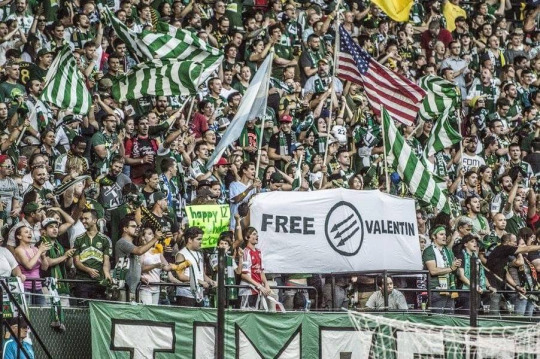
Valentin is an anti-fascist in Bremen, Germany that was imprisoned for defending himself and his friends against an ambush by a gang of nazi scum. Valentin was released from prison in November 2015.
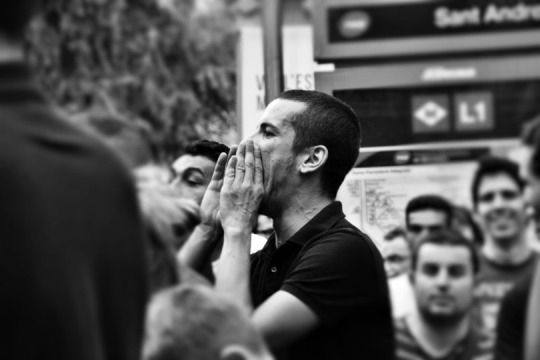
Sergi is a Spanish anti-fascist currently facing a lengthy prison sentence for defending himself at a protest against a neo-nazi concert.
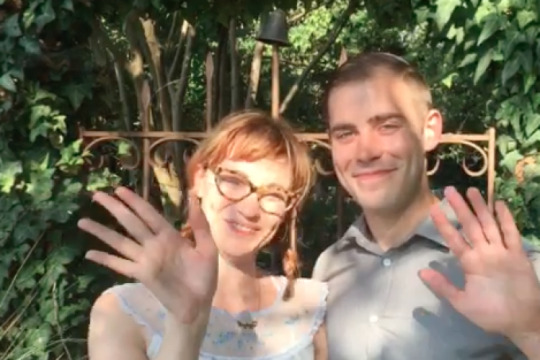
Stephen was charged with “breach of peace” for standing up against a KKK rally in Columbia, South Carolina, USA in July.

Eddien was also charged with various “crimes” for confronting the KKK at the same action Stephen attended. Eddien was released from prison in September 2015.
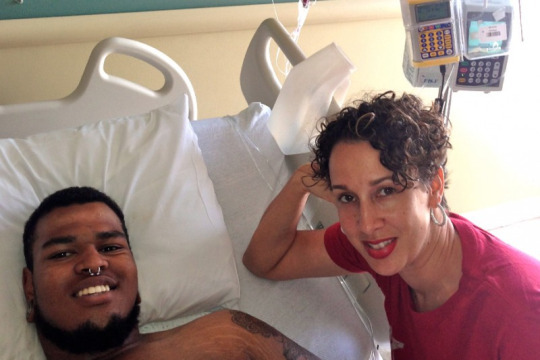
Jeremiah was at a concert when two neo-nazis showed up and started making trouble. Jeremiah confronted them and was nearly stabbed to death by one of the racist scumbags.

Paul is a German anti-fascist who was arrested at a July anti-Pegida action for the “crime” of carrying a flag with a flagpole the police was decided was “too short.” He was released from prison in September 2015.
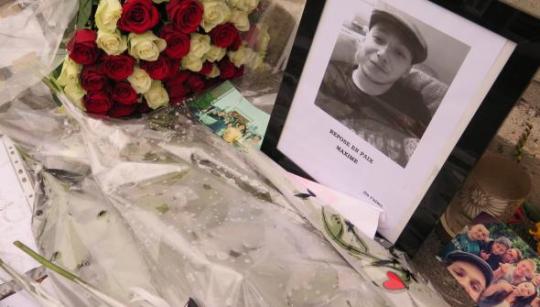
Maxime Bugsel was a young anti-fascist from Bruay-La Buissière who was shot to death late one night in August 2015. We were honoured to be able to help his family pay for his funeral expenses.

Maxime Bugsel was a young anti-fascist from Bruay-La Buissière who was shot to death late one night in August 2015. We were honoured to be able to help his family pay for his funeral expenses.
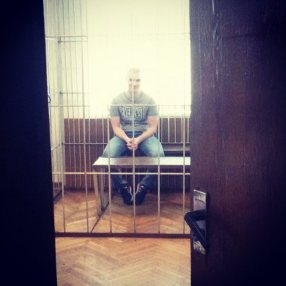
Vlad Lenko is an anti-fascist in Belarus currently serving a six-year prison sentence for defending himself against neo-nazis. We contributed to his legal defence, which hopes to mount an appeal of his brutal sentence.

An anti-fascist woman from Melbourne, Australia who was fined $1200 for her part in confronting the racist UPF in Bendigo in August 2015. Thanks to us and other donors, her fine was paid in full! More info here.
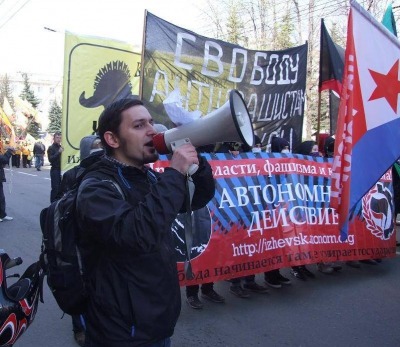
Oleg Serebrennikov is a Russian anti-fascist that was severely injured by nazi boneheads in 2004. While he hasn’t let that stop him from standing against racism, his injuries have required expensive ongoing treatment that the Fund is helping him pay for.

Joel is a Swedish anti-fascist that defended an peaceful anti-racist demonstration from a violent attack by neo-nazis. Joel is currently serving a severe sentence for his heroism and is due to parole in 2017. He also received a fine of 40000SEK, which we are helping him pay.


The Kungsan 15 are fifteen Swedish anti-fascists who were charged with various “crimes” for defending themselves and others against attacks by neo-nazis at an anti-racist march in Kungsan, Sweden. Two were acquitted but 13 of them received severe sentence of four-to-eighteen months in prison plus a cumulative total of 350,000SEK in fines.
HELP US HELP OUR BROTHERS & SISTERS IN THE FIGHT AGAINST HATE! If you agree that fighting hate is not a crime; if you believe that anti-fascism is self-defence; and if you want to show real solidarity with your fellow antifa, please make a donation to The International Anti-Fascist Defence Fund and encourage people you know to join you in donating.
You can make a monthly recurring donation to the Fund here.
You can make a one-time donation via paypal here.
A donation of at least $20U.S./€20/£15 gives you a voice in the funding decisions.
Please help us help our friends in the antifa movement! Donate to the Fund and spread the word!
sábado, 1 de agosto de 2015
Reclaim the Fields International Action Camp
 Am y fersiwn Cymraeg cliciwch yma.
Am y fersiwn Cymraeg cliciwch yma.
South Wales Anarchists will be participating at this camp.
If you are intrested in joining us email gaggededitorial[at]lists[dot]riseup[dot]net
About the camp
Reclaim the Fields (or RTF) UK was born in 2011, as a star in a wider constellation of food and land struggles that reaches around the globe. Since 2011, camps and other RTF gatherings have helped support local communities in struggle, share skills, developed networks, and strengthened the resistance to exploitation, in Bristol, west London, Gloucestershire, Nottingham and Fife among other locations.
Every two years there is also an international camp, where people from around Europe and beyond meet together to support a local struggle (from gold mining in Romania to open cast coal mining in Germany, for example). People share share stories and ideas about resistance and reclaiming our food system beyond national borders. This year, an international gathering will be held in in Wrexham, Wales.
The aims of the camp are:
To support local communities in the west and north west of England, and the north of Wales with their struggles against fracking
To increase participation in Reclaim the Fields
To demonstrate visible, active opposition to prison construction
To support Borras Community Protection Camp build a garden and infrastructure to become more self-reliant
To demonstrate the interconnection between these struggles
To inspire and radicalise everyone involved
To increase participation in Reclaim the Fields
To demonstrate visible, active opposition to prison construction
To support Borras Community Protection Camp build a garden and infrastructure to become more self-reliant
To demonstrate the interconnection between these struggles
To inspire and radicalise everyone involved
What’s taking place?
Actions – demonstrations & actions against companies involved in the construction of the North Wales prison, as well as local fracking-related targets. Everything from solidarity demos at local prisons to leafleting on Wrexham highstreet.
Workshops & Skillshares – Over the bank holiday weekend there will be abundant opportunities to learn, share, discuss and connect with other people.
Building & Growing on the site – Be part of installing gardens & low impact infrastructure at the community protection camp. Learn about permaculture, agroecology, forest gardening, mushroom growing, pallet construction, compost toilet making, off-grid electrics and more.
Why this camp? Why now?
This camp has been organised to support the local community in Borras to resist fracking in their area (as well as working with other local anti-fracking groups & protection camps in the North West who have been resisting extreme energy developments for a number of years). To find out more about their struggle visit: http://www.frackfreewrexham.org.uk/the-camp/
It has also been organised to give attention to the North Wales Prison Project that is being constructed. This will be Europe’s second largest prison holding 2100 prisoners and the first of a number of ‘mega prisons’ that the UK Government wish to build. Click here for more information about the prison, why we are against it & links to articles about the prison industrial complex in the UK
Practical Information about the Camp
Click on the links below to find more practical information about the camp and how to get involved:
Workshops & programme – what’s happening & how to contribute
Planning Actions
Directions & public transport information
What to bring
Safer Spaces Agreement
Accessibility of the site
Food & donations
Planning Actions
Directions & public transport information
What to bring
Safer Spaces Agreement
Accessibility of the site
Food & donations
Getting involved
This is a DIY camp and everyone is needed to get stuck in to make it happen. People are needed to:
Support with publicity before the event – sharing the gathering online, putting posters up, encouraging your local group to get involved. People are also needed to help design the programme, respond to emails & plan facilitation.
Helping with site set up & building infrastructure (planning this in advance & being on site a few days before the gathering)
Signing up to a shift over the weekend to help with cooking, site set up & safety, being on the welcome tent & so forth
Supporting local groups to organise actions
If you can help with any of these tasks please email info@reclaimthefields.noflag.org.uk
Who are Reclaim the Fields?
Who are Reclaim the Fields?
Click here to read a history of Reclaim the Fields in Europe
Click here to read a history of Reclaim the Fields in the UK
Click here to read a history of Reclaim the Fields in the UK
We are a group of peasants, landless and prospective peasants, as well as people who are taking back control over food production.
We understand “peasants” as people who produce food on a small scale, for themselves or for the community, possibly selling a part of it. This also includes agricultural workers.
We support and encourage people to stay on the land and go back to the countryside. We promote food sovereignty (as defined in the Nyéléni declaration) and peasant agriculture, particularly among young people and urban dwellers, as well as alternative ways of life. In Europe, the concept ‘food sovereignty’ is not very common and could be clarified with ideas such as ‘food autonomy’ and control over food systems by inclusive communities, not only nations or states. We are determined to create alternatives to capitalism through cooperative, collective, autonomous, real-needs-oriented, small-scale production and initiatives. We are putting theory into practice and linking local practical action with global political struggles.
In order to achieve this, we participate in local actions through activist groups and cooperate with existing initiatives. This is why we choose not to be a homogeneous group, but to open up to the diversity of actors fighting the capitalist food production model. We address the issues of access to land, collective farming, seed rights and seed exchange. We strengthen the impact of our work through cooperation with activists who focus on different tasks but who share the same vision.
Nevertheless, our openness has some limits. We are determined to take back control over our lives and refuse any form of authoritarianism and hierarchy. We respect nature and living beings, but will neither accept nor tolerate any form of discrimination, be it based on race, religion, gender, nationality, sexual orientation or social status. We refuse and will actively oppose every form of exploitation of other people. With the same force and energy, we act with kindness and conviviality, making solidarity a concrete practice of our daily life.
We support the struggles and visions of la Via Campesina, and work to strengthen them. We wish to share the knowledge and the experience from years of struggle and peasant life and enrich it with the perspectives and strength of those of us who are not peasants, or not yet peasants. We all suffer the consequences of the same policies, and are all part of the same fight.
Suscribirse a:
Entradas (Atom)


